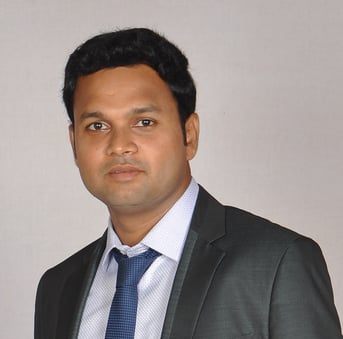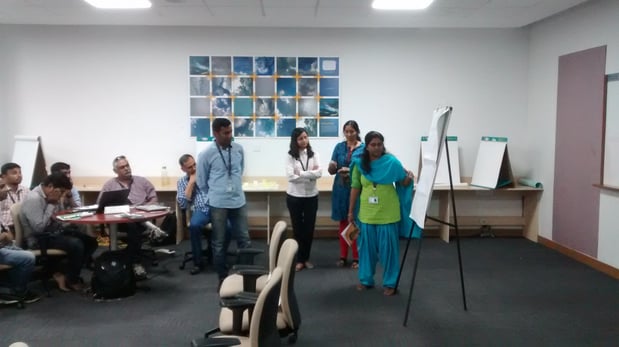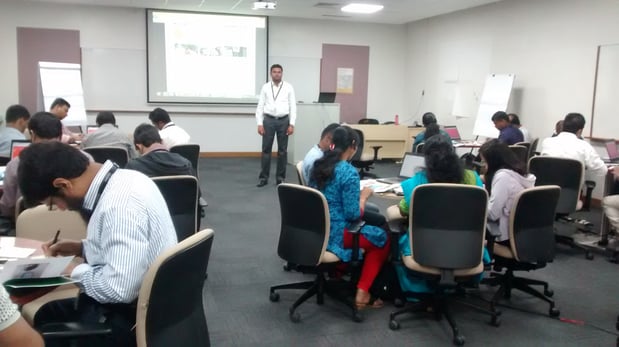(10 min read)
Dyaneshwaran Periyasamy is a consultant, trainer and coach specializing in design thinking and Agile at Hewlett Packard Enterprise in Bengaluru, India.
We spoke with Dyanesh about the relationship between Agile and design thinking, how he moved from programming to facilitating, and how every facilitation experience is a learning experience, too.

Name: Dyaneshwaran Periyasamy
Home: Bengaluru, India
Organization: Hewlett Packard Enterprise
Email: dyaneshwaran@gmail.com
What do you love most about being a facilitator?
I started my career as a Java programmer in 2004. I then tried my hand at quality assurance, as a Linux administrator, an IBM server administrator and a member of the support team. I was always trying to play multiple roles in the software development lifecycle. I was introduced to the Agile methodology while working for Nokia in 2006, and that’s when I began to pursue my career in the area of Agile. I started playing the role of Scrum Master, coaching and training teams on Agile methodologies, and this became my passion.
As an Agile coach and Facilitator I started asking myself how I could influence my team and organization the most. It’s easy to give the solutions, but as a coach you need to stand back and facilitate so that the team can come up with their own solutions.
I’ve now been with Hewlett Packard Enterprise (HPE) for the last two and a half years, within the Agile practice. We are a group of Agile coaches, and we conduct trainings for HPE employees internally in areas like Agile, Scrum, eXtreme Programming (XP), Lean and Kanban. When I came across the design thinking methodology, I thought “Ok, there is a connection between Lean, Agile and what we are trying to do in innovation.” We are trying to encourage innovation by employees a systematic approach towards problem solving.
Why is teaching others how to innovate and lead change important to you?
Naturally, I feel happy and satisfied by teaching and facilitating workshops for others. I strongly believe the more you teach, the more you learn. From every training or workshop session, I will take at least one learning. The more I share with others, the more I receive. Especially in terms of questions from the participants that make me think and research further. I definitely enjoy training others. It's in my blood.
Recently at HPE, we've started an organization-wide program to re-energize employees towards innovation. As an organization, we want all employees to be empowered to develop innovative ideas and solutions. In order for this to happen, the organization-wide initiative has involved training employees in the design thinking methodology. The sessions that I am conducting are aligned with HPE’s overall vision towards how we can motivate people towards innovation. So I’m thrilled to be contributing to this goal.
What was your most impactful facilitation experiences? And why was it so?
Early in my career with Nokia-Siemens-Networks, I trained a lot of teams in adopting the Agile methodology. That made me very recognizable. For example, if I went for lunch in the cafeteria people would say, “Oh, you are Dyanesh, you are an Agile coach!”. That was an impactful moment for me. I recognized that I was influencing colleagues to break away from their traditional approaches towards new ways working.

Out of the last three sessions facilitating ExperienceInnovation, the third one was really touching for me. There was a moment when the participants challenged the order of the design thinking model. A participant asked, “shouldn’t we observe people and then define the challenge?”. There was a rich debate within the workshop and in the end, the participants came up with the correct answer on their own. After every session, I am learning more about design thinking, the ExperienceInnovation simulation and best practices on facilitating.
What are your future outlooks on design thinking in India?
Design thinking is a concept that has been practiced for multiple centuries now, but in the world of IT, this thinking is quite new. People are now slowly adopting the same thinking processes in the world of software engineering. So that’s why everyone is asking: “What is design thinking? What is it all about?”. If you look at it, it’s a simpler approach towards problem solving.
There are many institutions within India that have already adopted design thinking practices. My outlook—particularly focusing on India and the IT industry—is that things are changing very fast, and organizations are trying to be more lean and agile. Unless we come up with innovative solutions ahead of what our competition does, it’s very hard to survive in today’s industry or business.
If we could peek into your facilitation bag, what would we find?
Apart from the training materials, I normally have a slide presenter, a laser pointer and a small water bottle. Our HPE design thinking facilitation team also has laminated sheets of ExperienceInnovation slides along with notes, that I’ll bring to every session.
What are you most proud of?

I’m really proud of making a difference in the lives of people by sharing knowledge.
I am proud to have the ability to teach my participants, employees and colleagues new topics and techniques that they can benefit from. Yes, I contribute to the organization, but before that I’ve made a difference in the lives of all my participants. That’s what I’m really proud of—making a difference in the lives of people by sharing knowledge.
If you could wake up tomorrow having gained one quality or ability, what would it be and why?
I’d like to wake up tomorrow with the ability to influence a larger crowd. It’s a leadership place that I’m looking for. Right now I’m leading a team of approximately two hundred people. I've always look up to the leaders who lead an entire organization, maybe 100,000 or 200,000 employees.
If you could work alongside someone for the day, who would it be and why?
I would like to work with Ken Schwaber. He is the co-creator of Scrum methodology, the powerful Agile methodology that is practiced by most of the teams around the world. If I get a chance to work with Ken, that will be my happiest moment in life.